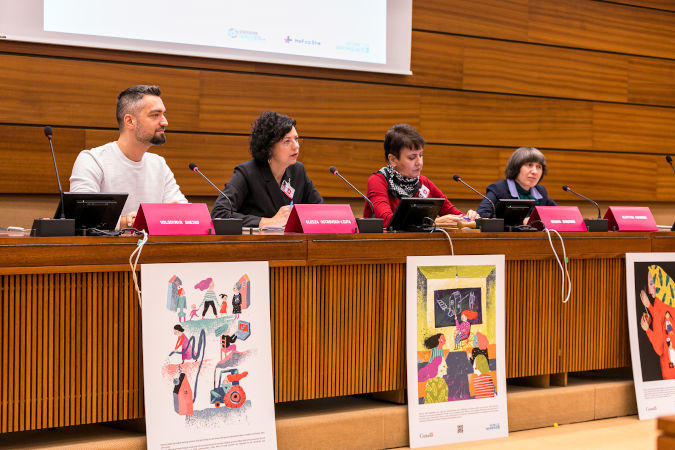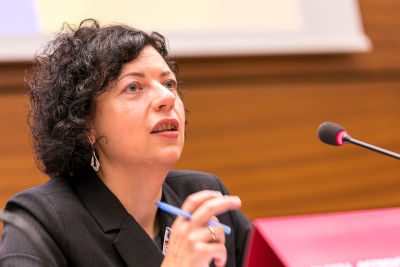Women artists in Ukraine take stock of their influence
Date:

UN Women in Ukraine brought prominent women artists to Geneva as part of the Beijing +25 Regional Review Meeting to discuss the shifting impact of women in the arts in Ukraine.
Women’s influence and contributions to the arts in Ukraine have evolved since the country’s independence, and during the Beijing+25 Regional Review Meeting for the UN Economic Commission for Europe (UNECE) region in late October, UN Women in Ukraine and the Ukrainian Institute hosted an event to examine how much impact gender equality has had on women artists and the arts in Ukraine in the past 25 years.
In the panel discussion Beijing+25: Raising Gender Issues through Contemporary Art, which took place on 30 October in Geneva, three renowned Ukrainian women artists and cultural managers, all winners and nominees of the Women in Arts 2019 Award, addressed the changing social and cultural roles of women in Ukraine. The award was created to celebrate and draw attention to the often-overlooked achievements of women artists in Ukraine.
The speakers contrasted the limited presence of women in Ukrainian art 25 years ago and their current substantive, wide-ranging contributions.
“In Soviet times all artists, male and female, produced propaganda. We couldn’t produce anything that could provoke change. Since then, female visual artists representation has grown and women’s artistic contributions and expressions look very different today,” said artist Alevtina Kakhidze.
The event on women in the arts was part of the larger lead up to the 25th anniversary of the Beijing Declaration and Platform for Action, which set a global agenda for gender equality and women’s rights. High-level government officials, and representatives of civil society and international organisations from North America, Europe, the Caucasus and Central Asia met in Geneva to take stock of progress on Beijing commitments.
During the panel discussions, Volodymyr Sheiko, Director-General of the Ukrainian Institute, asked about art’s power to impact women’s rights: “At a time when we talk about achieving true, not just declarative and formal gender equality, the question is, how can culture and the arts contribute to this? Can and should artistic practices be a communicative tool and a way of advocating for women's rights? How can artistic content, critique and debate fill “formal” equality at the legislative level with real content?”

Olesya Ostrovska-Lyuta, Director-General of Mystetskyi Arsenal, addressed the need for social change to complement legislative shifts: “What we learned from the Soviet Union was that simply putting women’s rights in legislation is not enough. If social practices don’t support gender equality legislation, women end up with a double burden: They can work full-time and also care for family, kids and housekeeping.”
“Our biggest problem is that every generation of female artists in Ukraine must start from the very beginning. We still do not have a full vision of women’s artistic traditions and of the contributions of our literary or artistic mothers and predecessors,” said writer and philosopher Oksana Zabuzhko.
The Women in Arts Award nominees will continue to empower voices of female artists in Ukraine and give visibility to the award itself, long after this international gathering. UN Women Ukraine and the Ukrainian Institute plan to promote more female voices to highlight their achievements and future impact on society.
The discussion was part of the HeForShe global solidarity movement in Ukraine and an element of a UN Women Ukraine project on gender equality at the centre of reforms, peace and security, financed with support from Sweden.